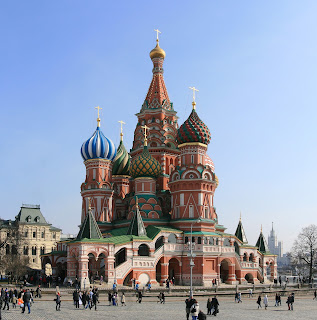4- Saint Basil's Cathedral or The Cathedral of vasily the Blessed
Saint Basil's Cathedral is a church in Moscow, Russia. The building, now a museum, is officially known as the Cathedral of the Intercession of the Most Holy Theotokos on the Moat or Pokrovsky Cathedral.
It was built from 1555-61 on orders from Ivan the Terrible and commemorates the capture of Kazan and Astrakan. A world famous landmark, it was the city's tallest building until the completion of the Ivan the Great Bell Tower in 1600.
The original building known as Trinity Church and later Trinity Cathedral, contained eight side churches arranged around the ninth, central church of Intercession; the tenth church was erected in 1588 over the grave of venetrated local saint Vasily(Basil).
In the 16th and 17th centuries the church, percieved as the earthly symbol of the Heavenly City, as happens to all churches in Byzantine Christianity, was popularly known as the "Jerusalem" and served as an allegory of the Jerusalem Temple in the annual Palm Sunday parade attended by the Patriarch of Moscow and the tsar.
The building is shaped as a flame of bonfire rising into the sky, a design that has no analogues in Russian architecture. Dmitry Shvidkovsky , in his book Russian Architecture and the West, states that "it is like no other Russian building. Nothing similar cane be found in the entire millennium of Byzantine tradition from the fifth to fifteenth century ... a strangeness that astonishes by its unexpectedness, complexity and dazzling interleaving of the manifold details of its design." The cathedral foreshadowed the climax of Russian national architecture in the 17th century.
As part of the program of state atheism, the church was confiscated from the Russian Orthodox community as part of the Soviet Union's anti-theist campaigns and has operated as a division of the State Historical Museum since 1928. It was completely and forcefully secularized in 1929 and remains a federal property of the Russian Federation. The church has been part of the Moscow Kremlin and Red Square UNESCO World Heritage Site since 1990. It is often mislabelled as the Kremlin owing to its location on Red Square in immediate proximity of the Kremlin.
Red Square, early 17th century. Fragment from Bleau atlas. The
structure with three roof tents in foreground, left is the original detached
belfry of the Trinity Church, not drawn to scale. Trinity Church stands
behind it, slightly closer to the road starting at St. Frol's(later Saviour's)
Gate of the Kremlin. The horseshoe-shaped object near the road in
the foreground is Lobnoye Mesto.
A church in Kolomenskoye, a probable
infleunce on the cathedral.
Front elevation drawing of the cathedral's facade and
overhead view of floor plan.
Saint Basil's Cathedral as viewed
from Red Square.
The small dome on the left marks the
sanctuary of Basil the Blessed(1588).
Color scheme of the cathedral is best
seen by night.
Murals in the galleries.
Address- Red Square, Moskva, Russia, 109012
Opened- July 12, 1561
Hours- Sunday to Monday- 11:00 am to 5:00 pm
Height- 48 m
Phone- +7 495 698-33-04
Architects- Postnik Yakovlev, Ivan Barma
Architectural styles- Russian architecture, Byzantine architecture
Function- Place of worship, Church
Burials- Basil Fool for Christ, Peter Petreius, Alexei Komech
Saint Basil's Cathedral is a church in Moscow, Russia. The building, now a museum, is officially known as the Cathedral of the Intercession of the Most Holy Theotokos on the Moat or Pokrovsky Cathedral.
It was built from 1555-61 on orders from Ivan the Terrible and commemorates the capture of Kazan and Astrakan. A world famous landmark, it was the city's tallest building until the completion of the Ivan the Great Bell Tower in 1600.
Saint Basil's Cathedral
In the 16th and 17th centuries the church, percieved as the earthly symbol of the Heavenly City, as happens to all churches in Byzantine Christianity, was popularly known as the "Jerusalem" and served as an allegory of the Jerusalem Temple in the annual Palm Sunday parade attended by the Patriarch of Moscow and the tsar.
The building is shaped as a flame of bonfire rising into the sky, a design that has no analogues in Russian architecture. Dmitry Shvidkovsky , in his book Russian Architecture and the West, states that "it is like no other Russian building. Nothing similar cane be found in the entire millennium of Byzantine tradition from the fifth to fifteenth century ... a strangeness that astonishes by its unexpectedness, complexity and dazzling interleaving of the manifold details of its design." The cathedral foreshadowed the climax of Russian national architecture in the 17th century.
As part of the program of state atheism, the church was confiscated from the Russian Orthodox community as part of the Soviet Union's anti-theist campaigns and has operated as a division of the State Historical Museum since 1928. It was completely and forcefully secularized in 1929 and remains a federal property of the Russian Federation. The church has been part of the Moscow Kremlin and Red Square UNESCO World Heritage Site since 1990. It is often mislabelled as the Kremlin owing to its location on Red Square in immediate proximity of the Kremlin.
Red Square, early 17th century. Fragment from Bleau atlas. The
structure with three roof tents in foreground, left is the original detached
belfry of the Trinity Church, not drawn to scale. Trinity Church stands
behind it, slightly closer to the road starting at St. Frol's(later Saviour's)
Gate of the Kremlin. The horseshoe-shaped object near the road in
the foreground is Lobnoye Mesto.
infleunce on the cathedral.
overhead view of floor plan.
from Red Square.
sanctuary of Basil the Blessed(1588).
seen by night.
Address- Red Square, Moskva, Russia, 109012
Opened- July 12, 1561
Hours- Sunday to Monday- 11:00 am to 5:00 pm
Height- 48 m
Phone- +7 495 698-33-04
Architects- Postnik Yakovlev, Ivan Barma
Architectural styles- Russian architecture, Byzantine architecture
Function- Place of worship, Church
Burials- Basil Fool for Christ, Peter Petreius, Alexei Komech








No comments:
Post a Comment